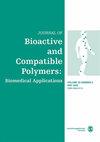Synthesis and characterization of amine functionalized cellulose nanogel for transdermal drug delivery
IF 2.2
4区 生物学
Q3 BIOTECHNOLOGY & APPLIED MICROBIOLOGY
引用次数: 0
Abstract
This study presents the synthesis and characterization of an amine-functionalized cellulose nanogel (AFCNG) for potential biomedical applications. AFCNG is synthesized using a combination of acid hydrolysis, TEMPO oxidation, and EDC/NHS-mediated coupling via amide linkage. Biodegradable AFCNG is formulated with a mean size of 74 nm through a regeneration process. The characterization of AFCNG is performed using various techniques such as FTIR spectroscopy, XRD, XPS, Zeta potential, DLS, HRSEM, and TGA. The result reveals that the anionic AFCNG is amorphous, highly stable in colloidal form, and has a higher degradation temperature and water absorption capacity. Biodegradation of AFCNG is also assessed by incubating it with lysozyme for 5 weeks, which results in a degradation level of 83%. There is negligible hemolytic activity and less cytotoxicity toward 3T3 cells induced by the AFCNG. The model drug, curcumin, is effectively loaded on AFCNG, which is highly released at an acidic pH by using the Franz diffusion method. The anionic ligand-based CAFCNG is effectively conjugated with the cationic folic acid receptors on the surface of B16-F10 cell lines through receptor-mediated endocytosis. The resulting CAFCNG shows notable cytotoxicity to B16-F10 cells. The results imply that CAFCNG is a suitable candidate for the treatment of skin cancers by using an effective transdermal drug carrier.用于透皮给药的胺功能化纤维素纳米凝胶的合成与表征
本研究介绍了一种具有生物医学应用潜力的胺功能化纤维素纳米凝胶(AFCNG)的合成与表征。AFCNG 的合成结合了酸水解、TEMPO 氧化和 EDC/NHS 介导的酰胺偶联。通过再生工艺配制出平均尺寸为 74 nm 的可生物降解 AFCNG。利用傅立叶变换红外光谱、XRD、XPS、Zeta 电位、DLS、HRSEM 和 TGA 等多种技术对 AFCNG 进行了表征。结果表明,阴离子 AFCNG 为非晶态,胶体形式高度稳定,具有较高的降解温度和吸水能力。还通过将 AFCNG 与溶菌酶一起培养 5 周来评估其生物降解性,结果显示降解水平为 83%。AFCNG 的溶血活性可以忽略不计,对 3T3 细胞的细胞毒性也较小。模型药物姜黄素被有效地负载在 AFCNG 上,并通过弗兰兹扩散法在酸性 pH 条件下得到了高度释放。基于阴离子配体的 CAFCNG 可通过受体介导的内吞作用与 B16-F10 细胞系表面的阳离子叶酸受体有效结合。由此产生的 CAFCNG 对 B16-F10 细胞具有显著的细胞毒性。这些结果表明,CAFCNG 是一种有效的透皮药物载体,是治疗皮肤癌的合适候选药物。
本文章由计算机程序翻译,如有差异,请以英文原文为准。
求助全文
约1分钟内获得全文
求助全文
来源期刊

Journal of Bioactive and Compatible Polymers
工程技术-材料科学:生物材料
CiteScore
3.50
自引率
0.00%
发文量
27
审稿时长
2 months
期刊介绍:
The use and importance of biomedical polymers, especially in pharmacology, is growing rapidly. The Journal of Bioactive and Compatible Polymers is a fully peer-reviewed scholarly journal that provides biomedical polymer scientists and researchers with new information on important advances in this field. Examples of specific areas of interest to the journal include: polymeric drugs and drug design; polymeric functionalization and structures related to biological activity or compatibility; natural polymer modification to achieve specific biological activity or compatibility; enzyme modelling by polymers; membranes for biological use; liposome stabilization and cell modeling. This journal is a member of the Committee on Publication Ethics (COPE).
 求助内容:
求助内容: 应助结果提醒方式:
应助结果提醒方式:


